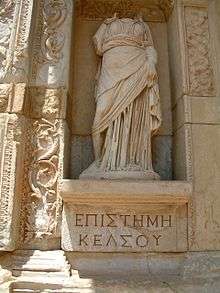Episteme
Episteme (Ancient Greek: ἐπιστήμη, epistēmē, 'science' or 'knowledge'; French: épistémè) is a philosophical term that refers to a principled system of understanding; scientific knowledge. The term comes from the Ancient-Greek verb epístamai (ἐπῐ́στᾰμαι), meaning 'to know, to understand, to be acquainted with'.[1] The term epistemology is derived from episteme.

Plato contrasts episteme with doxa: common belief or opinion.[2] The term episteme is also distinguished from techne: a craft or applied practice.[3]
Western philosophy
Foucault (épistémè)
French philosopher Michel Foucault, in his The Order of Things, uses the term épistémè in a specialized sense to mean the historical, non-temporal, a priori knowledge that grounds truth and discourses, thus representing the condition of their possibility within a particular epoch. In the book, Foucault describes épistémè:[4]
In any given culture and at any given moment, there is always only one episteme that defines the conditions of possibility of all knowledge, whether expressed in a theory or silently invested in a practice.
In subsequent writings, he makes it clear that several épistémè may co-exist and interact at the same time, being parts of various power-knowledge systems. However, he does not discard the concept
I would define the episteme retrospectively as the strategic apparatus which permits of separating out from among all the statements which are possible those that will be acceptable within, I won’t say a scientific theory, but a field of scientificity, and which it is possible to say are true or false. The episteme is the ‘apparatus’ which makes possible the separation, not of the true from the false, but of what may from what may not be characterised as scientific.[5]
Relation to Kuhn's paradigm
Foucault's use of épistémè has been asserted as being similar to Thomas Kuhn's notion of a paradigm, as for example by Jean Piaget.[6] However, there are decisive differences.
Whereas Kuhn's paradigm is an all-encompassing collection of beliefs and assumptions that result in the organization of scientific worldviews and practices, Foucault's episteme is not confined to science—it provides the grounding for a broad range of discourses (all of science itself would fall under the episteme of the epoch). One might say that a paradigm is subsumed within an episteme.
Kuhn's paradigm shifts are a consequence of a series of conscious decisions made by scientists to pursue a neglected set of questions. Foucault's episteme is something like the 'epistemological unconscious' of an era; the resultant configuration of knowledge of a particular episteme is, to Foucault, based on a set of primordial, fundamental assumptions that are so basic to the episteme that they're experientially "invisible" to the constituents (such as people, organizations, or systems) operating within the episteme.
Moreover, Kuhn's concept corresponds to what Foucault calls theme or theory of a science, though Foucault analyzed how opposing theories and themes could co-exist within a science.[7] Kuhn does not search for the conditions of possibility of opposing discourses within a science, but simply for the invariant dominant paradigm governing scientific research (supposing that one paradigm always is pervading, except under paradigmatic transition).
Foucault attempts to demonstrate the constitutive limits of discourse, and in particular, the rules enabling their productivity; however, Foucault maintains that, though ideology may infiltrate and form science, it need not do so: it must be demonstrated how ideology actually forms the science in question; contradictions and lack of objectivity is not an indicator of ideology.[8]
"Truth is a thing of this world: it is produced only by virtue of multiple forms of constraint. And it induces regular effects of power. Each society has its regime of truth, its "general politics” of truth: that is, the types of discourse which it accepts and makes function as true; the mechanisms and instances which enable one to distinguish true and false statements, the means by which each is sanctioned; the techniques and procedures accorded value in the acquisition of truth; the status of those who are charged with saying what counts as true."[9][10]
Kuhn's and Foucault's notions are possibly influenced by the French philosopher of science Gaston Bachelard's notion of an "epistemological rupture." as indeed was Louis Althusser.
Judith Butler
In 1997, Judith Butler used the concept of episteme in her book Excitable Speech, examining the use of speech-act theory for political purposes.
See also
Notes
- ἐπιστήμη, ἐπίστασθαι. Liddell, Henry George; Scott, Robert; A Greek–English Lexicon at the Perseus Project.
- δόξα in Liddell and Scott.
- τέχνη in Liddell and Scott.
- Foucault, Michel. [1966] 1970. The Order of Things: An Archaeology of the Human Sciences. p. 168.
- Foucault, Michel (1980), Power/Knowledge, p. 197.
- Piaget, Jean (1970) [1968], Structuralism, p. 132.
- Foucault 1969, ch. II.IV.
- Foucault 1969, ch. IV.VI.c.
- Foucault, Michel. 1980. "Truth and Power." Pp. 109–33 in Power/Knowledge: Selected Interviews & Other Writings 1972-1977, edited by C. Gordon. Brighton: Havester.
- Rabinow, Paul, ed. 1991. The Foucault Reader: An introduction to Foucault’s thought. London: Penguin. ISBN 0140124861.
References
- Foucault, Michel (1980) [1969], L'Archéologie du savoir [The Archaeology of Knowledge] (in French), Paris: Gallimard.
- Foucault, Michel (1994) [1966], Les Mots et Les Choses [The Order of Things] (in French), New York: Vintage.